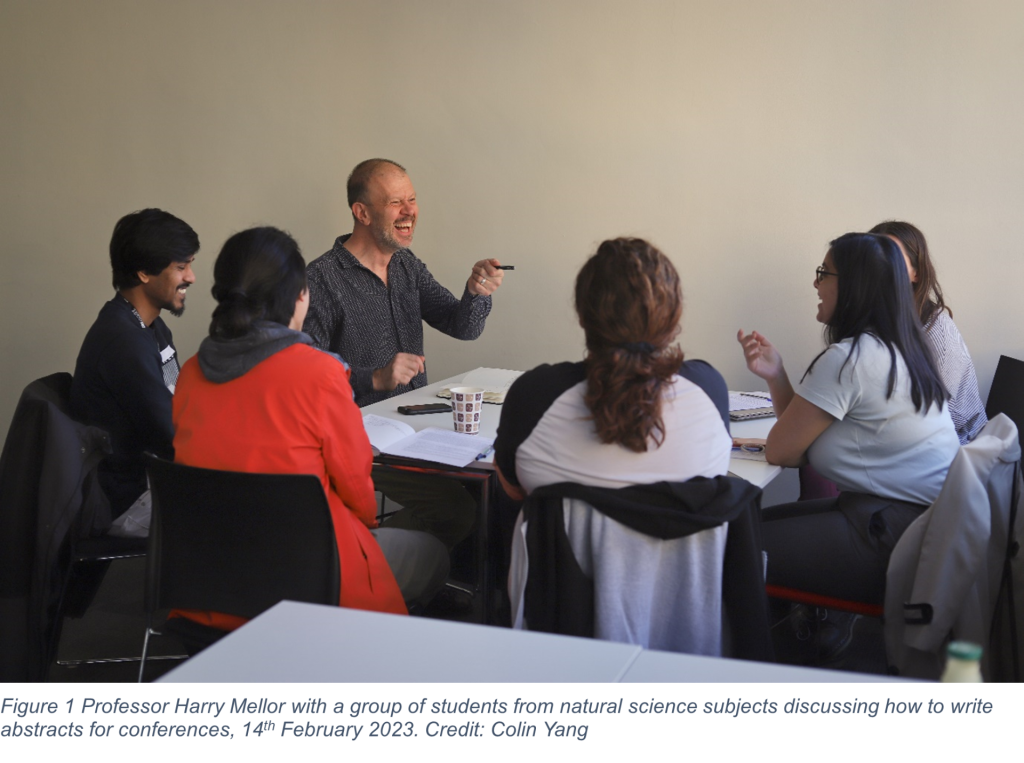By Antonia Voigt and Deepti R Bhat; PhD students, School of Education
A generous grant under the “Enhancing Research Culture” scheme at the University of Bristol enabled us to provide our postgraduate research community with a unique and much needed learning experience.
Over three months, from February to April 2023, we ran four workshops under the heading “Learning to connect: Building our research community through effective communication”. These included a session on learning how to write an impactful conference abstract, how to design a captivating presentation, and deliver it in a memorable way, and lastly, how to build relationships through networking.
We are excited to know that we were able to make a difference to our postgraduate research community through this project. In this blog, we want to share our experience and three take-away messages.
Moving forward from this project, one thing is clear: more student-driven workshops are needed to prepare us for the multi-faceted academic life ahead. We would also like to see more opportunities for building cross-disciplinary relationships.

Our take away messages
We developed some key take away messages from the workshops and the collaborative discussions that we were part of.
- Workshops designed by students for students
The purpose of our grant was to enhance the research culture at the University of Bristol. Reflecting on our own experiences and career ambitions as well as on discussions with fellow students, we identified areas where the postgraduate community was keen to develop academic skills. In addition, we wanted to offer training that was complementary to that provided by Bristol Doctoral College.
To make these trainings as useful as possible for our community, we co-designed with the facilitators each workshop. In hindsight, the thoughts and time that we invested in this process could not have been spent better. Our facilitators responded imaginatively to our specific requests. Piero Vitelli, for example, came up with his simple yet genius “one-voice” exercise. We had asked him to teach us techniques to present in groups. In this fun exercise, two students were asked to read each one half of a sentence while sounding like one voice.
- Focused on essential skills for academic conferences
The delivery of academic presentations can sometimes appear dry and inaccessible. Our mission was to give postgraduate students tools to change that. The overarching theme of our workshops was building a relationship with the person on the receiving end of students’ ideas, whether this is an abstract reviewer, the audience in a lecture hall or a colleague at a networking lunch.
From our post-workshop surveys, we know that most students intended to present at a conference this year. We were absolutely delighted to hear when students told us that our workshops had prepared them for this important step in their academic careers. A few have already had their conference abstracts accepted, applying their learning from workshop one!
- Connected across our disciplines
With our workshops we wanted to attract students from across our research community. We are proud that fellow postgraduate researchers from social sciences, medicine and natural sciences joined us to develop key academic skills. In addition to facilitated group discussions in the workshops, we provided lunches. These informal occasions allowed us to connect, eat and laugh together. We built connections across our disciplines and bonded over shared interests, which was particularly important for the workshop on writing abstracts.
Our facilitators for this workshop showed us that connections across disciplines are vital. Professor Roger Jeffery, a social scientist from the University of Edinburgh, collaborated with Professor Harry Mellor and Associate Professor Ruth Kipping from natural sciences and medical studies at the University of Bristol, respectively. Thanks to this collaborative effort we were able to learn about general and discipline-specific techniques of abstract writing. The comparison across disciplines allowed us insights that would not have been possible from staying just within our own fields!
“I really enjoyed [the workshop on creating presentations] and got inspired and received excellent tips in an environment that is much needed between PGRs. I truly recognise your work and appreciate your initiative, hoping many great projects come soon.”
Doctoral student in Politics, 17th March 2023
Further information
For more information on our project, please get in touch with antonia.voigt@bristol.ac.uk
Acknowledgements
We would like to thank Colin Yang, Ruizhe Zhang and Shang Wu for their contributions to this project as well as staff in the School of Education for helping us with administrative tasks of this research grant.
This project received funding through the Enhancing Research Culture Fund, as supplied by Research England and distributed by the University of Bristol.
About the authors

Antonia Voigt is a second-year PhD student at the School of Education. She is passionate about improving the postgraduate research culture and community at the University of Bristol. The project ‘Learning to Connect’, funded by Enhancing Research Culture, aimed to increase students’ skills and confidence. Antonia is also leading the organising committee for this year’s PGR conference and has been elected as the 2023/24 PGR representative for the Faculty of Social Sciences and Law.

Deepti R Bhat is a first-year PhD student at the School of Education. She is examining how the injustices in formal education affect students from marginalised communities in India. Her work engages with decolonial and anti-caste perspectives and involves co-creating pathways to an epistemically just future. She envisions a PGR community that is supportive and enables each other to thrive. She partnered with Antonia for the project ‘Learning to Connect’ to work towards this vision along with fellow PGRs.
